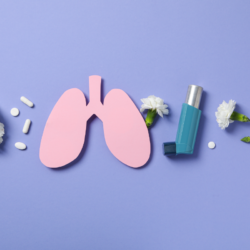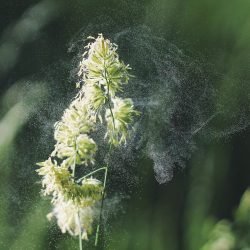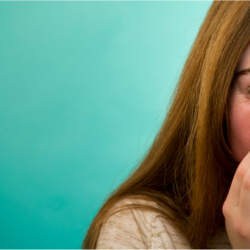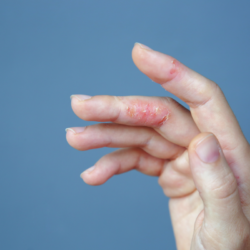Spring marks the arrival of fine weather, but also of seasonal allergies. These ailments affect more and more people, young and old alike. Sneezing, coughing, conjunctivitis… The spring season and its climatic conditions favour the appearance of these crises. Pollen and pollution, the body reacts to these aggressions and alerts you. These symptoms, linked to seasonal conditions, are more often than not benign and easily treatable. Find out how to combat seasonal allergies with peace of mind.
Understanding seasonal allergies
Seasonal allergies are the body’s reactions to external aggression. The body fights antigens, called allergens, present in the environment. Faced with these allergens, the body and the immune system show an exacerbated reaction. Dust, pollen, pollution… the source of theallergy can be as diverse and varied as it is indeterminate. It may even be a combination of several factors, or the allergy may develop gradually after a sensitisation phase. The arrival of spring increases the risk of attacks: more potentially pathogenic volatile particles in the air, variations in temperature… There are many potential allergens, and reactions vary from person to person.
There is no standard allergy pattern, but as many allergies as there are allergic people. The symptoms depend on each person’s immune system. While allergies can be hereditary, they can also be contracted by both children and adults.
Whether chronic, benign or hereditary,allergies can take many forms. The typical symptoms of an allergic attack are easy to recognise: rhinitis, dry cough, incessant sneezing, sore throat, watery eyes… all symptoms of an environmentalallergy. Depending on the case, these problems can affect sleep, mood and daily life… In the case of a serious allergy, we recommend that you consult a doctor so that appropriate treatment can be put in place.
Preventing exposure to allergens
It is possible to take preventive action to help the body avoid over-reacting in the presence of an allergen. The 2 areas in which you need to be vigilant are eliminating allergens and “preparing” your body. The first recourse in the event of a seasonal allergy is to determine the origin of the allergic reaction. Dust? Pollen? Mites?
Adopt simple gestures
- Air your home early in the morning or late at night when pollen levels are lower.
- Change your sheets regularly.
- Wear sunglasses to protect your eyes.
- Change your clothes and wash your hair after going outdoors.
- Use an air purifier to filter out indoor allergens.
- Avoid drying clothes outside during the pollen season.
Adjust your diet
Certain foods can help reduce inflammation and boost the immune system:
- Foods rich in quercetin (apples, onions, citrus fruits, berries) have natural antihistamine properties.
- The omega-3s found in oily fish, flaxseed and walnuts help to reduce inflammation.
- Turmeric, with its curcumin, is a powerful natural anti-inflammatory.
Natural solutions to relieve allergy symptoms
When the symptoms are there, it’s possible to deal with them naturally.
Plants and natural supplements to help during allergy season
- Plantain: a natural antihistamine that soothes irritation.
- Black cumin: its seeds and oil help reduce allergic reactions.
- Nettle: renowned for its anti-inflammatory and antihistamine properties.
Whether yourallergy is mild, moderate or severe, it’s important to calm your body for your own well-being. In the event of anallergy, you can soothe your body with remedies that are as effective as they are natural. Bud complexes soothe the allergic reaction and strengthen the immune system. The gemmotherapy-based formulation combines the benefits of Birch Pubescent, Blackcurrant and Beech buds. This complex of active ingredients drains and detoxifies the body while strengthening the natural barriers. It’s your shield against seasonal discomforts!
Homeopathy and essential oils
If you’re looking for a peaceful solution to your allergy, you can turn to homeopathic solutions. These are the ideal allies for soothing the symptoms of allergic rhinitis: blocked nose, runny nose, sneezing… But also transient allergic conjunctivitis. But also essential oils or hydrolats… A few examples:
- Allium Cepa 9CH and Lung Histamine 15CH are often recommended in homeopathy.
- Black spruce essential oil helps boost the immune system.
- Roman chamomile essential oil soothes inflammation.
Breathing and nasal cleansing
Wash your nose daily with saline solution or salt water to remove pollen and soothe the nasal mucosa. The Rhino Horn or Lota is a natural choice for allergies. Unlike medicines, which can have undesirable side effects, it’s a safe and effective way to clean your sinuses and relieve nasal allergies. It’s also environmentally friendly, as it doesn’t require batteries or electricity to operate. Practising alternate breathing (pranayama) can strengthen your respiratory system by purifying and decongesting the nasal cavities and sinuses.
Improve your lifestyle
- Get plenty of sleep to boost your immunity.
- Reduce stress, which can aggravate allergic reactions.
- Play sports indoors to avoid outdoor pollen peaks.
Our animal friends can also suffer from allergies. Naturopathy in the treatment of allergies in animals focuses on the use of non-invasive methods and natural remedies, such as dietary interventions and medicinal plants. This holistic approach aims to stimulate the body’s natural healing mechanisms and restore internal balance without synthetic drugs. However, an assessment by a qualified veterinary naturopathic practitioner is essential for appropriate treatment.
Conclusion
By adopting these simple, natural measures, it is possible to live better with seasonal allergies and effectively reduce their symptoms. A holistic approach that includes diet, herbal medicine and good habits can help you combat these seasonal discomforts with complete peace of mind. If symptoms persist, don’t hesitate to consult a health professional.
Source:
- https://www.inserm.fr/dossier/allergies/#:~:text=de destroy it -,Allergy is a disturbance of the immune system corresponding to exposure to an allergenic substance.
- https://www.pollens.fr/
- https://pasteur-lille.fr/2022/04/27/allergies-pollen-traitement/





